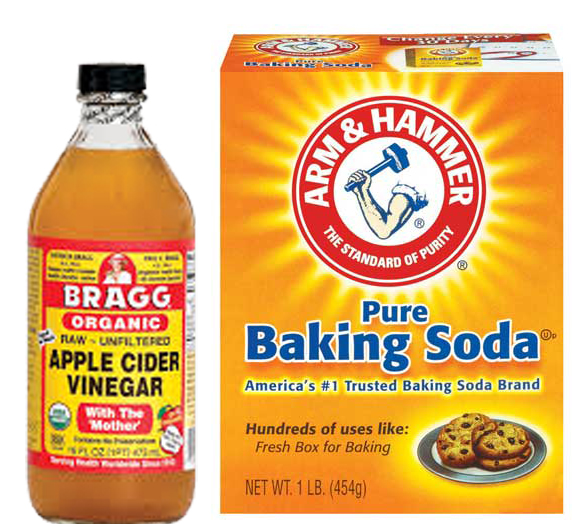Drinking Apple Cider Vinegar and Baking Soda: A Fresh Look at an Old Remedy
Drinking apple cider vinegar and baking soda might seem odd, but it’s becoming a popular health trend. When combined, these two household items are thought to balance your body’s pH and provide potential health benefits. Supporters say this mixture can help with digestion, reduce inflammation, and improve joint mobility because of its unique properties.

You’ll also find that apple cider vinegar is often used on its own for weight loss and digestive health benefits. Baking soda on its own can help with heartburn and neutralizing stomach acid. By bringing them together, some believe the effects are amplified, though it’s important to be cautious with how much you consume.
While it sounds appealing, it’s essential to consider any possible side effects. Too much apple cider vinegar can erode tooth enamel, and excessive baking soda can upset your stomach. Mixing a safe, recommended amount is key to enjoying the benefits while keeping the risks at bay.
Key Takeaways
- Mixing apple cider vinegar and baking soda may offer health benefits.
- Watch the amounts used to avoid potential side effects.
- Both ingredients are beneficial on their own for different health issues.
The Basics of Apple Cider Vinegar and Baking Soda
Apple cider vinegar (ACV) and baking soda are common household items with distinct uses. When combined, they create an interesting chemical reaction. Let’s explore what each component is and how they interact.
What Is Apple Cider Vinegar (ACV)?
Apple cider vinegar is made from fermented apple juice. The fermentation process turns sugars in the apples into acetic acid, which gives ACV its tart taste and strong smell. This acid also makes ACV quite acidic, with a pH of around 2-3. People often use ACV in cooking, cleaning, and sometimes in beauty routines.
ACV may offer health benefits like aiding digestion and supporting skin health. It’s also believed to help with blood sugar control and weight management. However, drinking it straight might damage tooth enamel due to its acidity. It’s usually diluted in water when consumed.
Understanding Baking Soda
Baking soda is a white powder also known as sodium bicarbonate. It’s a base, meaning it has a pH above 7, making it alkaline. This property allows it to neutralize acids. In baking, it helps dough rise by producing carbon dioxide when it reacts with an acid.
You can also find baking soda in cleaning products and deodorants. It helps eliminate odors by balancing the pH level of various substances. Since it’s mild, it can be used in skin care and even as a natural exfoliant without being too harsh.
Chemical Reaction Between ACV and Baking Soda
When you mix apple cider vinegar with baking soda, an interesting chemical reaction occurs. The acetic acid in ACV reacts with the alkaline baking soda. This creates carbon dioxide gas, which bubbles and fizzes. This reaction is what makes the combination effective for cleaning.
The mixture results in a solution with a pH closer to neutral. Some believe this balances the body’s pH, promoting health. However, you should be cautious with consumption. Overuse can lead to side effects like upset stomach or changes in your body’s acid-base balance. It’s always best to use in moderation and consult a healthcare professional if you have concerns.
Potential Health Benefits
Drinking apple cider vinegar mixed with baking soda can offer several promising health benefits. This combination may aid digestion, support weight management, regulate blood sugar and cholesterol, and strengthen your immune system.
Digestive Aid
Mixing apple cider vinegar with baking soda can help improve digestion. Apple cider vinegar is known for helping with indigestion, gas, and bloating due to its ability to enhance stomach acid. When your stomach acid is balanced, you may experience less discomfort from issues like acid reflux and gas.
The mixture may create a more alkaline metabolic environment in the body. Although some believe this helps alkalize your body, it’s important to note that your body regulates pH naturally. So, any effects might be modest, but for those with digestion woes, this combination could provide relief.
Weight Management
If you’re looking for help with weight management, apple cider vinegar might be beneficial. Some studies suggest it can promote weight loss by increasing metabolism and fat loss. It may even help reduce belly fat when paired with a healthy diet and regular exercise.
Consuming apple cider vinegar could increase feelings of fullness. This might help you eat fewer calories throughout the day. It’s important to remember that weight loss involves multiple factors, but adding this mixture could support your efforts.
Blood Sugar and Cholesterol Regulation
Apple cider vinegar has shown potential in regulating blood sugar levels and improving insulin sensitivity. This could be particularly helpful for individuals managing diabetes or prediabetes.
There is some evidence that it may help lower cholesterol levels as well. By possibly reducing bad cholesterol and increasing good cholesterol, this drink might contribute to better heart health. Integrating it with lifestyle changes could bring noticeable benefits over time.
Immune System Support
The potential of the apple cider vinegar and baking soda mixture to support your immune system is an area of interest. Apple cider vinegar has antimicrobial properties, which might help fight harmful bacteria like E. coli, S. aureus, and C. albicans.
However, it’s more preventative than curative, so while it may bolster your defenses, it’s no replacement for medical treatment. Including it as part of a balanced diet might keep you healthier by reducing some risks.
Usage and Considerations
When combining apple cider vinegar and baking soda, there are several key factors to consider regarding how to consume them, their effects on pH balance, and integrating them into your diet. Careful usage can help ensure potential benefits while minimizing any risks.
How To Drink Apple Cider Vinegar and Baking Soda
To drink apple cider vinegar and baking soda safely, start by mixing a small amount. Combine 1-2 tablespoons of apple cider vinegar with a pinch of baking soda in a glass of water. This helps dilute the acidity, making it easier on your stomach and teeth.
Drink the mixture before meals to possibly aid digestion. It’s crucial not to overconsume, as too much can lead to issues like heartburn. Listen to your body and adjust the amounts as needed.
Staying hydrated is important when drinking this mix. Adding this routine to a healthy lifestyle, along with regular exercise, may enhance its benefits.
Understanding the pH Balance
Apple cider vinegar and baking soda are often discussed for their effect on the body’s pH levels. Vinegar is acidic, while baking soda is alkaline. In theory, combining them may help balance pH levels, but significant changes in pH could cause issues like metabolic acidosis.
Consuming this mix is unlikely to drastically alter your body’s pH, but it can be part of an effort to maintain balance. Eating a variety of alkaline and acidic foods within a balanced diet supports natural pH regulation.
Consulting with a healthcare professional is wise if you’re considering this for conditions like metabolic alkalosis.
Diet Integration
Integrating apple cider vinegar and baking soda into your daily diet can be simple. Use the drink as a pre-meal tonic or mix it with a bit of honey for taste. When combined with a well-rounded diet, it may support weight management by promoting a feeling of fullness and aiding digestion.
Consider your calorie intake and overall nutrition. Pairing this drink with natural remedies and regular exercise may enhance health benefits.
Remember, no single remedy can replace a healthy diet and lifestyle. Aim for balance in food choices, hydration, and routine activities.
Precautions and Side Effects
When consuming apple cider vinegar and baking soda, it’s important to be aware of potential impacts on your body. Both have unique characteristics that could affect different areas of your health. You need to be cautious about enamel damage, possible side effects, and sodium intake.
Effects on Tooth Enamel and Sensitivity
Apple cider vinegar is acidic, and this acidity can weaken your tooth enamel. When tooth enamel is worn down, teeth can become sensitive. This might make it painful to eat hot or cold foods. To reduce these effects, you can rinse your mouth with water after drinking the mixture.
You could try using a straw to prevent the liquid from making contact with your teeth. It’s also a good idea to avoid brushing your teeth immediately after drinking, as this can further erode weakened enamel. Taking these steps can help protect your teeth and reduce discomfort.
Possible Side Effects
Taking too much apple cider vinegar and baking soda can lead to various side effects. For instance, apple cider vinegar might cause throat burns due to its acidic nature. If you experience heartburn, it may not be the best option for you.
Remember that vinegar can also act as a diuretic, meaning it could increase urination frequency. This might lead to dehydration if you don’t drink enough water. Some people also report stomach issues, like cramps or diarrhea. It’s a good idea to start with small amounts to test your body’s reactions.
Understanding Sodium Intake
Baking soda is high in sodium, which could be a concern if you are watching your sodium intake. Consuming too much sodium can lead to high blood pressure and other health issues. Guidelines suggest not exceeding more than 3 one-half teaspoons if you’re over 60 years old.
If you’re already taking diuretics or have a condition like urinary tract infections, high sodium levels can complicate your health further. Always keep track of your total sodium intake to avoid potential problems. Balancing your diet is key to maintaining good health.
External Application and Skin Health
Applying apple cider vinegar (ACV) to your skin may offer several benefits, particularly for those suffering from certain skin conditions. It has been used as a natural remedy due to its potential anti-inflammatory and antimicrobial properties, which can be helpful for acne and eczema.
ACV and Skin Conditions
ACV is often used as a natural remedy for skin issues. People with acne may find ACV beneficial because it can help reduce bacteria on the skin and balance pH levels. Dab some diluted ACV on pimples with a cotton ball to potentially help clear your skin.
For those with eczema, ACV might offer relief. It is thought to soothe the skin and reduce inflammation. Always dilute ACV with water before applying it to avoid irritation. Being mindful of your skin’s reaction is essential. If irritation occurs, stop use immediately.
Long-Term Safety and Recommendations
When thinking about the long-term safety of drinking apple cider vinegar and baking soda, it’s important to be cautious. Regular consumption may have some benefits, but it’s wise to consider the impact on your health over time.
Kidney Function: Your kidneys work hard to balance your body’s pH. Consuming too much baking soda might alter this balance and stress your kidneys. Especially if you have a condition like chronic kidney disease, you should be careful.
Joint Pain and High Blood Pressure: While some people claim benefits for joint pain, there isn’t much scientific support. Apple cider vinegar might help control blood pressure, but it shouldn’t replace medications prescribed by a doctor.
Always talk to a healthcare provider before making it a daily habit.
Recommendations:
- Start small: Use a small amount and see how you feel.
- Moderation is key: Avoid consuming large quantities regularly.
- Discuss with your doctor: If you have health issues, such as kidney problems, consult your doctor.
Staying informed and careful can help you make the best choices for your health. Remember, what works for one person might not be right for you.
Frequently Asked Questions
When you mix apple cider vinegar and baking soda, you might find benefits for weight loss and cleaning. Drinking apple cider vinegar regularly can affect your body in different ways, and it’s also used for skin and feet treatments.
What’s the proper ratio of apple cider vinegar to baking soda for weight loss?
Mixing these two ingredients is popular for potential weight loss. A common suggestion is using about one tablespoon of apple cider vinegar with a pinch of baking soda in a glass of water. Adjust the amounts based on personal taste preferences.
Can you tell me the benefits of drinking apple cider vinegar and baking soda mixed together?
People often talk about benefits like increased feelings of fullness, which might help with eating less. This combination also balances pH levels and possibly supports digestion. It’s important to be mindful of any digestive sensitivity you might have.
What happens to your body if you start drinking apple cider vinegar and baking soda regularly?
Drinking apple cider vinegar may help with digestion and improve your skin. It can help manage blood sugar levels and may contribute to weight loss over time. Be cautious of its acidity, as it might affect tooth enamel or cause digestive discomfort if taken in excess.
How effective is drinking apple cider vinegar and baking soda in reducing belly fat?
There isn’t strong scientific evidence that this mixture specifically targets belly fat. However, some people find that apple cider vinegar helps with overall fat loss when combined with a balanced diet and exercise. Its role in managing calorie intake might be why some see changes.
Why might someone soak their feet in a mix of apple cider vinegar and baking soda?
A foot soak using this mixture might help with odor and softening the skin due to vinegar’s acidic nature and baking soda’s soothing effects. It can also help with fungal infections by maintaining healthy pH levels on the skin.
Are there any cleaning benefits when using apple cider vinegar with baking soda?
This combo is known for its cleaning power. It can tackle clogs, clean surfaces, and even deodorize. The fizzy reaction when they’re mixed helps lift stains, making it useful for household cleaning tasks. Just be sure to test surfaces to avoid damage.

